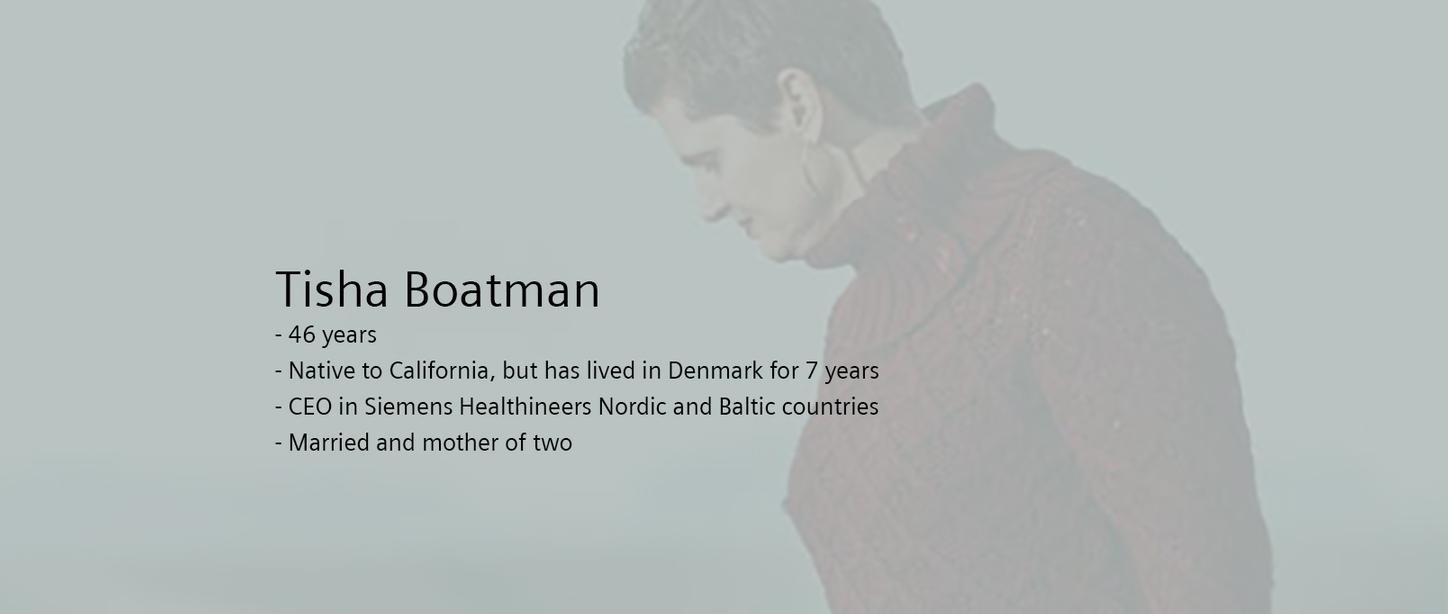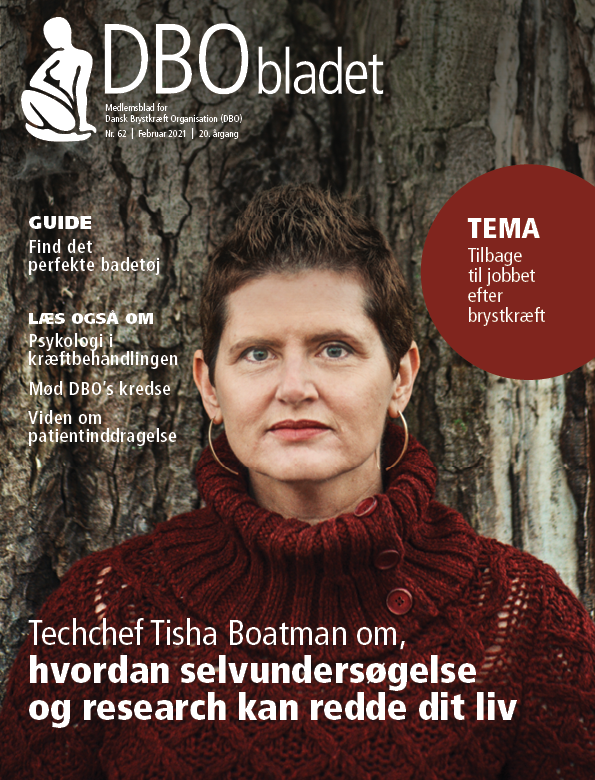
CEO and breast cancer patient
Tisha Boatman sits at the long meeting table. She is 46 years old, mother of two girls. Former soldier in the US Army and today chief executive of one of the world's largest technology companies - Siemens Healthineers - in the Nordic and Baltic countries. And she's also something she cannot fully identify herself with yet: A breast cancer patient.
As CEO of Siemens Healthineers, Tisha Boatman's expertise has over the years sold PET CT scanners and ultrasound machines, which are used for example to examine women for breast cancer and so she stood on the stage in front of 1,000 people in China, where she, as a specialist, has shown ultrasound images of breasts and has told about how difficult it can be to find tumors in dense breast tissue with mammography scanners.
Tisha Boatman knows what the scanners are capable of, and that the private healthcare system in Denmark has older scanners, while the public sector has more updated scanners and software - although they rarely let the healthcare staff set aside time to get to know the equipment.
“ I have told the hospital management that they can actually save a lot of money if they get a little course in how to use the machines including the software and the artificial intelligence. Apart from the fact that this means savings, it is most important of all an efficiency improvement, because the patients can be examined much faster and more thoroughly, and the healthcare staff can utilize the full potential of the machines for the benefit of the patients, rather than the machines just collecting dust," says Tisha Boatman: "That's why I get a little provoked when people in the healthcare system think that PET CT scans are too expensive."
Consultation with Dr. Google
Tisha Boatman has always believed in technology, but a friend kept urging her to do some self-examination after she herself was diagnosed with breast cancer: "Remember your self-examination, Tish, remember it!"
Tisha Boatman shrugs a little. Why on earth should she have breast cancer? Woman in her mid-40s, healthy, fit, no breast cancer history in the family.
"It's kind of unlikely, isn't it?" she says: "And then there is only bad luck."
Still, a few years ago, Tisha Boatman began self-examining herself. At first, she found it a bit odd to stand there and feel her breasts, for what was the point? But each time, she heard the friend’s voice: "Remember your self-examination, Tish," so she did it dutifully once a month. Until something one day suddenly felt different. A hard lump, which was not hurting.
"It was definitely a lump, so I consulted Dr. Google, who stated that it was probably breast cancer because the lump did not hurt. But you get a death sentence on Google very quickly, so I took it easy”, says Tisha Boatman, who, however, booked an appointment with her general practitioner, who immediately sent her into a cancer treatment screening program.
There she is. At Rigshospitalet in front of a mammography scanner. It is April 2020 during the Covid-19 shutdown, so there are no relatives with her. Until then, she has taken it relatively lightly that she now has to have a clinical mammography, because "come on," of course it is not breast cancer - seriously - Dr. Google always says so much. The mammography, however, indicates that there is something, but Tisha Boatman's breast tissue is too dense to see what it is, so the doctor changes to ultrasound. And quite rightly, there is something.
"Yes, you probably know what it means when the lump does not hurt," says the doctor: "We have to assume it's cancer."
Tisha nods. Dr. Google was right.

Photographer Jeppe Carlsen. All rights reserved
Treatment start-up
Shortly after Tisha Boatman was diagnosed, she returned to the hospital. The doctors want to give her chemotherapy before the operation in an attempt to shrink the lump in her breast. But Tisha is surprised that the only basis they have decided on are the mammography and the ultrasound, where it was difficult to see the lump at all due to the dense breast tissue, and not at all its size. "How about a PET CT scan so we can better determine what treatment I should get," Tisha Boatman asks the doctor, adding: "It may show some more. Maybe my breast tissue is too dense to really see the size of the lump. ” "We do not do that in Denmark," the doctor answers: "It is too expensive." Tisha Boatman receives chemo and is feeling surprisingly well during this time. She runs every day and can easily take care of her work. Until she has the lump removed in September. "I expected to be told that the cancer was gone and that I could do a little radiation. But the doctor told that the lump was much larger than expected and that the cancer had spread to some of the lymph nodes. I was speechless. It was the opposite of everything they had said, so this time I insisted on a PET CT scan, and they did not dare do anything else, ”explains Tisha Boatman.

Photographer Jeppe Carlsen. All rights reserved
Not bad until November
Two months later, she is sitting at the meeting table at Siemens. She has been through her second surgery, which hopefully has now removed the cancer. That morning, for the first time in five weeks, she has been on a treadmill. She just walked calmly on it, but just moving makes the black thoughts that have started to come a little too often disappear. She also hopes to soon be able to get up to her horses and ride, and she desperately misses playing polo. The otherwise sunny month of November has gotten into her.
"Breast cancer was not bad until November," she states.
The severity of Tisha Boatman's breast cancer was not detected because she has dense breast tissue
“I asked for a PET CT scan. But the doctors were so certain that this was a stage two cancer and a tiny lump that had not spread at all. They saved a scan so I could end up fighting for my life. It's really hard to accept, ”says Tisha Boatman: "What you can afford in the US health care system determines the treatment you receive. In Denmark it is said that we have equal access to healthcare, but let's be honest: I only got the PET CT scan in the end, because I had researched and knew more about dense breast tissue than the doctor and could therefore refer to the European guidelines in this area. And because I insisted. I actually think that is unsafe. ”
Tisha Boatman moves a little in the chair, leans forward, puts her index finger on the table and says:
"No, in fact, I think it's more than that. It's not ok at all! It is the intention that we in Denmark should have equal access to the health care system. But that is clearly not the case, so my advice to all women is now: Examine yourself and insist on the best treatment. Because we deserve it - no matter who we are."

Danish Breast Care Organization magazine no 62, February 2021
